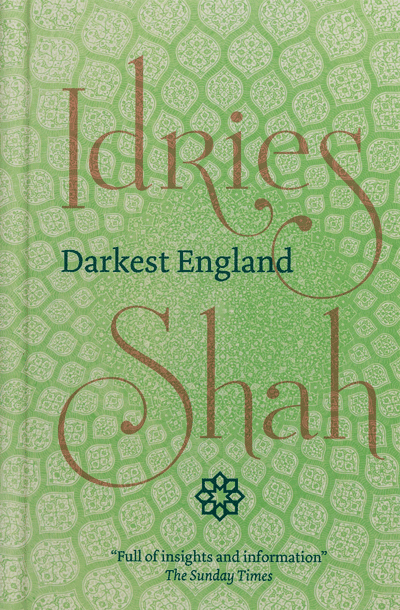The first book in Shah’s well-known trilogy that explores why the English are as strange as they are, from their roots as nomadic warriors to their world-dominating empire.
In his best-selling Darkest England, Idries Shah examines the strange customs and behaviours of the exotic tribe known as The English.
He asserts that the English, once a nomadic clan of warriors with possible roots in a distant Eastern land, fled westward, bringing with them epic tales, traditions, and an Oriental way of thought. Shah charts their genius in adopting and adapting ‘almost anything spiritual, moral or material’ for their own use – a faculty that has transformed them from warrior nomads into successful and resilient diplomats, businessmen, thinkers and scientists.
An astute and hilarious work that explains the English to themselves – and others – Darkest England also humorously turns on its head the propensity for Westerners to Eurocentrically observe foreign cultures.
‘Full of insights and information assembled to present a view no English person could easily reach. Very funny.’
Sunday Times
‘The quirky, imperturbable nature of English character submitted to an enthusiastic analysis.’
The Sunday Express
Foreword
Roots and Anglekins
Cruel Lords
Damage Control
Certainly Not From Trinidad
Angles Down the Road
Pliny Rules in Badgersden
The Cypher
Gy-i Fee-a
The Dear Martian
Wise Men Never Tell
Tribal Rituals
Unsuitable for Antarctica
All Very Well in Nairobi
Woadlore
Carriemoss
Pirates and Admirals
Xavier Turlough is My Name
Stands to Reason
Smoke and Frozen Tiger
Demons of the Upper Air
Just Before Albania
Mouse in Milk
Government by Astonishment
Guerrilla at the Palace
Security, and So On
The Secret System of the Angleans
What He’s Really Like
Thrakintwist and Ciclaton
Watching Them
Heisenberg Wasn’t So Original
Secret Rituals
The Hidden Teaching Method
Where IS Everybody?
Going Native
New English Bottles
The Solution
Nothing of Significance to Say
FOREWARD
Spend time in England, and look at its people; and even without the insights of anthropology you’ll notice that your experiences are strangely like those which the English themselves used to report from their far-flung Empire. You’ll not get malaria or easily Go Native: but you may well contract bronchitis and learn to Muddle Through.
A hundred kinds of social manoeuvring replace ritual dances, found elsewhere: though totemism is rife. There is no broiling sun, but I can guarantee wind and rain aplenty. Magical potions, whether offered for alcoholic forgetfulness or instant beauty, are not lacking, either. Today, indigent beggars are uncommon: but a thousand importuning salespeople besiege you at the door, through the media, even on the telephone. Local and national chiefs? A myriad of them, in tax offices, companies, town halls, public utilities, vicarages or manors, answer well enough.
Tribal organisation, native chants and war-cries, exotic regalia, strange attire: they have them all. The darkness of England is filled with superstition. On unlucky Friday the Thirteenth, millions feel the hair rising on the backs of their necks. Ladders are avoided as assiduously as any taboo objects anywhere; black cats, rabbits’ feet and newspaper astrology all have their devotees. And as for cults...
The magnificent dignity of a proud and remote people, cut off as surely as any Himalayan community or long-house settlement, excites our admiration, as such survivals must. Some, at least, of the amazing delicacies of the table would intrigue anyone: pie and mash, cows’ heel jelly, bubble and squeak, to name but a few.
The English, like all isolated peoples with archaic ways, are splendid. And they have produced endless numbers of dauntless explorers of other peoples’ countries. Names like Rhodes, Thesiger and Newby and hundreds more, testify to the record.
This book, however, is not written by one of their disciples, respected though these pioneers may be.
I take my inspiration from such as Ibn Battutah of Tangier, the extraordinary fourteenth-century globetrotter who still holds the record as the greatest traveller of all time. And from Ibn Khaldun of Tunisia; accepted, even in the West, as the first theoretician of human historical development – the founder of sociology, in fact.
Springing from a family settled since the ninth century in the folds of the Hindu-Kush, though myself born in the Himalayas, I have trodden many a lonely path, faced many hazards, noted many a confidence, to assemble these impressions of Darkest England.
Providing you’re tough, there are adequate rewards in this endeavour; as the English say, ‘It’s a Great Life if you Don’t Weaken’.
From Darkest England by Idries Shah Copyright © The Estate of Idries Shah
Idries Shah was born in India in 1924 into an aristocratic Afghan family. He was an author and teacher in the Sufi tradition and is considered one of the leading thinkers of the 20th century.
Shah devoted his life to collecting, translating and adapting key works of Sufi classical literature for the needs of the West. Called by some 'practical philosophy' - these works represent centuries of Sufi and Islamic thought aimed at developing human potential. His best-known works include the seminal book The Sufis, several collections of teaching stories featuring the ‘wise fool’ Nasrudin, Reflections and Knowing How to Know.
Shah's corpus - over three dozen books on topics ranging from psychology and spirituality to travelogues and cultural studies - have been translated into two dozen languages and have sold millions of copies around the world. They are regarded as an important bridge between the cultures of East and West.
UK Paperback
ISBN: 978-1-78479-168-1
Language: English
US Paperback
ISBN: 978-1-78479-171-1
Language: English
UK Hardcover
ISBN: 978-1-78479-418-7
Language: English
US Hardcover
ISBN: 978-1-78479-419-4
Language: English
UK eBook
ISBN: 978-1-78479-170-4
Language: English
US eBook
ISBN: 978-1-78479-173-5
Language: English
UK Kindle
ISBN: 978-1-78479-169-8
Language: English
US Kindle
ISBN: 978-1-78479-172-8
Language: English
UK Large Print
ISBN: 978-1-78479-427-9
Language: English
US Large Print
ISBN: 978-1-78479-428-6
Language: English
